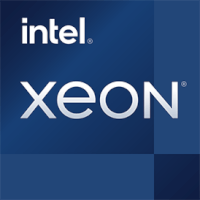Intel Xeon E5-2667 v4
The Intel Xeon E5-2667 v4 operates with 8 cores and 16 CPU threads. It run at 3.60 GHz base 3.40 GHz all cores while the TDP is set at 135 W.The processor is attached to the LGA 2011-3 CPU socket. This version includes 25.00 MB of L3 cache on one chip, supports 4 memory channels to support DDR4-2400 RAM and features 3.0 PCIe Gen 40 lanes. Tjunction keeps below -- degrees C. In particular, Broadwell E Architecture is enhanced with 14 nm technology and supports VT-x, VT-x EPT, VT-d. The product was launched on Q1/2016

| Frequency | 3.20 GHz |
| CPU Cores | 8 |
| CPU Threads | 16 |
| Turbo (1 Core) | 3.60 GHz |
| Turbo (8 Cores): | 3.40 GHz |
| Hyperthreading | Yes |
| Overclocking | No |
| Core Architecture | normal |
Where to Buy?
Buy Intel Xeon E5-2667 v4
Memory & PCIe
| Memory type | DDR4-2400 |
| Max memory | |
| Memory channels | 4 |
| ECC | Yes |
| Bandwidth | -- |
| PCIe | 3.0 x 40 |
Encryption
| AES-NI | Yes |
Internal Graphics
| Memory type | DDR4-2400 |
| GPU name | no iGPU |
| GPU frequency | |
| GPU (Turbo) | No turbo |
| Generation | |
| DirectX Version | |
| Execution units | |
| Shader | |
| Max memory | -- |
| Max. displays | |
| Technology | 14 nm |
| Release date |
Technical details
| Instruction set (ISA) | x86-64 (64 bit) |
| Architecture | Broadwell E |
| L2-Cache | -- |
| L3-Cache | 25.00 MB |
| Technology | 14 nm |
| Release date | Q1/2016 |
| Socket | LGA 2011-3 |
Thermal Management
| TDP (PL1) | 135 W |
| TDP (PL2) | -- |
| TDP Up | -- |
| TDP Down | -- |
| Tjunction max | -- |
Geekbench 5, 64bit (Single-Core)
Geekbench 5 is a cross plattform benchmark that heavily uses the systems memory. A fast memory will push the result a lot. The single-core test only uses one CPU core, the amount of cores or hyperthreading ability doesn't count.
Geekbench 5, 64bit (Multi-Core)
Geekbench 5 is a cross plattform benchmark that heavily uses the systems memory. A fast memory will push the result a lot. The multi-core test involves all CPU cores and taks a big advantage of hyperthreading.
Estimated results for PassMark CPU Mark
Some of the CPUs listed below have been benchmarked by CPU-Comparison. However the majority of CPUs have not been tested and the results have been estimated by a CPU-Comparison’s secret proprietary formula. As such they do not accurately reflect the actual Passmark CPU mark values and are not endorsed by PassMark Software Pty Ltd.
Cinebench R15 (Single-Core)
Cinebench R15 is the successor of Cinebench 11.5 and is also based on the Cinema 4 Suite. Cinema 4 is a worldwide used software to create 3D forms. The single-core test only uses one CPU core, the amount of cores or hyperthreading ability doesn't count.
Cinebench R15 (Multi-Core)
Cinebench R15 is the successor of Cinebench 11.5 and is also based on the Cinema 4 Suite. Cinema 4 is a worldwide used software to create 3D forms. The multi-core test involves all CPU cores and taks a big advantage of hyperthreading.
Geekbench 3, 64bit (Single-Core)
Geekbench 3 is a cross plattform benchmark that heavily uses the systems memory. A fast memory will push the result a lot. The single-core test only uses one CPU core, the amount of cores or hyperthreading ability doesn't count.
Geekbench 3, 64bit (Multi-Core)
Geekbench 3 is a cross plattform benchmark that heavily uses the systems memory. A fast memory will push the result a lot. The multi-core test involves all CPU cores and taks a big advantage of hyperthreading.
Cinebench R11.5, 64bit (Single-Core)
Cinebench 11.5 is based on the Cinema 4D Suite, a software that is popular to generate forms and other stuff in 3D. The single-core test only uses one CPU core, the amount of cores or hyperthreading ability doesn't count.
Cinebench R11.5, 64bit (Multi-Core)
Cinebench 11.5 is based on the Cinema 4D Suite, a software that is popular to generate forms and other stuff in 3D. The multi-core test involves all CPU cores and taks a big advantage of hyperthreading.


